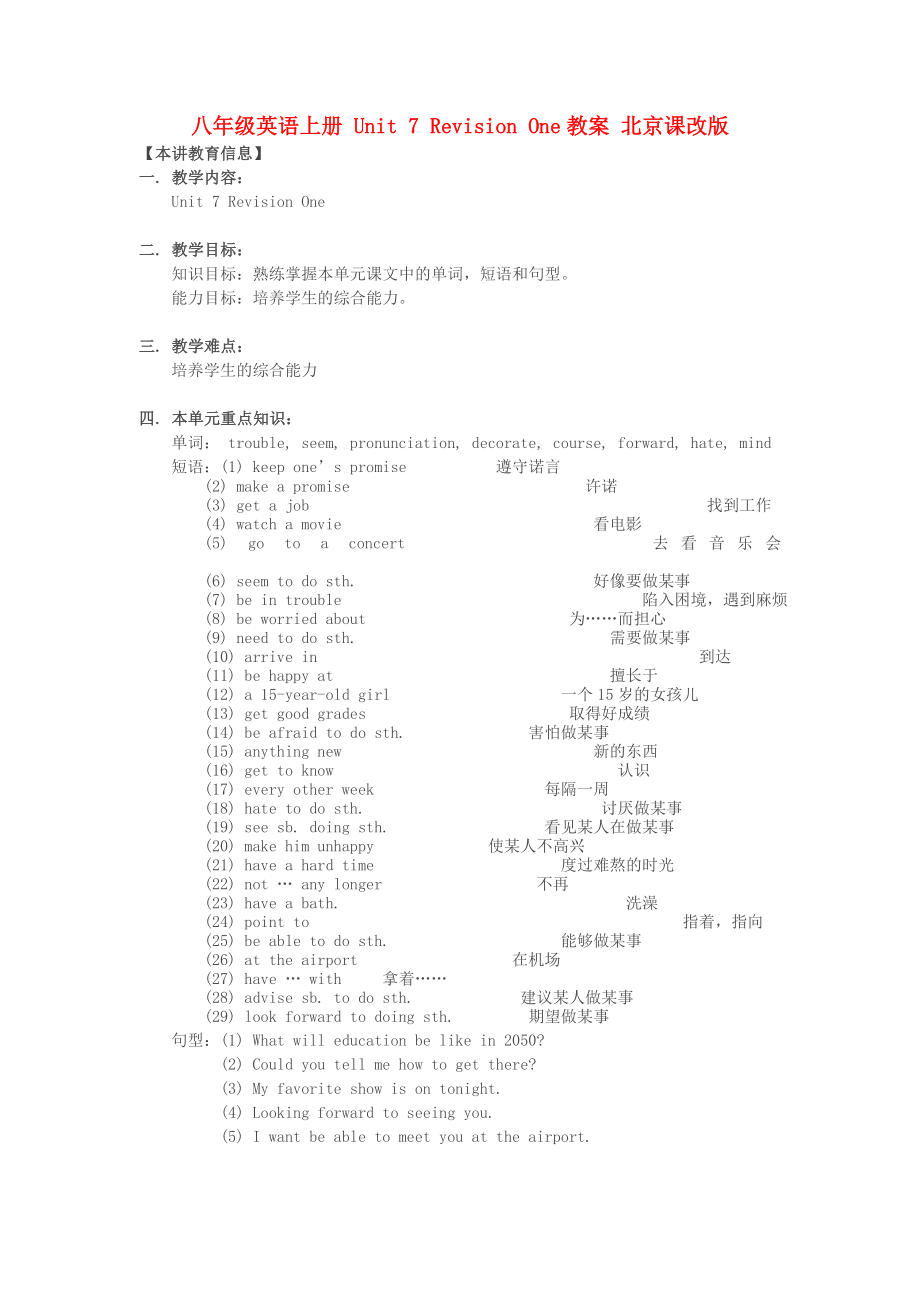《八年級(jí)英語上冊(cè) Unit 7 Revision One教案 北京課改版》由會(huì)員分享�����,可在線閱讀����,更多相關(guān)《八年級(jí)英語上冊(cè) Unit 7 Revision One教案 北京課改版(3頁珍藏版)》請(qǐng)?jiān)谘b配圖網(wǎng)上搜索�����。
1�����、八年級(jí)英語上冊(cè) Unit 7 Revision One教案 北京課改版
【本講教育信息】
一. 教學(xué)內(nèi)容:
Unit 7 Revision One
?
二. 教學(xué)目標(biāo):
知識(shí)目標(biāo):熟練掌握本單元課文中的單詞�,短語和句型。
能力目標(biāo):培養(yǎng)學(xué)生的綜合能力。
?
三. 教學(xué)難點(diǎn):
培養(yǎng)學(xué)生的綜合能力
?
四. 本單元重點(diǎn)知識(shí):
單詞: trouble, seem, pronunciation, decorate, course, forward, hate, mind
短語:(1) keep one’s promise????? 遵守諾言
(2) make a prom
2����、ise?????????????? 許諾
(3) get a job???????????????????????? 找到工作
(4) watch a movie??????????????? 看電影
(5) go to a concert?????????????? 去看音樂會(huì)?????????????????
(6) seem to do sth.?????????????? 好像要做某事
(7) be in trouble?????????????????? 陷入困境,遇到麻煩
(8) be worried about???????????? 為……而擔(dān)心
(9) nee
3���、d to do sth.??????????????? 需要做某事
(10) arrive in??????????????????????? 到達(dá)
(11) be happy at ???????????????? 擅長(zhǎng)于
(12) a 15-year-old girl?????????? 一個(gè)15歲的女孩兒
(13) get good grades???????????? 取得好成績(jī)
(14) be afraid to do sth.??????? 害怕做某事
(15) anything new??????????????? 新的東西
(16) get to know???
4�����、?????????????? 認(rèn)識(shí)
(17) every other week?????????? 每隔一周
(18) hate to do sth.?????????????? 討厭做某事
(19) see sb. doing sth.????????? 看見某人在做某事
(20) make him unhappy ?????? 使某人不高興
(21) have a hard time??????????? 度過難熬的時(shí)光
(22) not … any longer????????? 不再
(23) have a bath.????????????????? 洗澡
(24)
5�����、point to ?????????????????????? 指著��,指向
(25) be able to do sth.?????????? 能夠做某事
(26) at the airport????????? 在機(jī)場(chǎng)
(27) have … with?? 拿著……
(28) advise sb. to do sth.?????? 建議某人做某事
(29) look forward to doing sth.???? 期望做某事
句型:(1) What will education be like in 2050?
(2) Could you tell me how to ge
6、t there?
(3) My favorite show is on tonight.
(4) Looking forward to seeing you.
(5) I want be able to meet you at the airport.
?
五. 重點(diǎn)知識(shí)講解:
1. trouble.
(1) vt.? vi
① 使憂慮�����、苦惱�、煩惱? 例如:
Don’t trouble yourself about it.?? 別為那事煩自己了。
What he said troubled me a lot.?? 他說的話使我很煩���。
② 麻煩��、勞駕
May I t
7���、rouble you to help me?? 麻煩你幫我一下好嗎�?
I’m sorry to trouble you. ???? ?對(duì)不起麻煩您了�。
(2) n. 煩惱、憂慮����、故障? 例如:
What’s your trouble???????????? 您哪里不舒服????
I’m sorry I have given you so much trouble.?? 對(duì)不起給您添麻煩了����。
What’s the trouble with the machine?? 這臺(tái)機(jī)器出什么毛病了?
(3) 短語:① ask for trouble? 自找麻煩
② be in troubl
8����、e?????????????????? 有困難,出事
③ get into the trouble????????? 遇到麻煩
④ make the trouble???????????? 惹麻煩����,搗亂
2. seem v.
(1) 看來好像,似乎����。 seem to do sth.? 例如:
You seem to be interested in science.?? 你好像對(duì)科學(xué)很感興趣���。
I seemed to hear someone calling.??????? 我好像聽見有人在叫我。
I can’t seem to fall asleep at night.????
9�����、????????? 我似乎夜晚無法入睡���。
(2) 似乎���,好像? seem + adj.
You seem very happy today.? ???????????? 今天你看上去很高興。
It seems raining today.?????????????????????????????? 今天似乎有雨�。
The skirt seems expensive.????????????????? 這條裙子似乎貴了點(diǎn)。
(3) 似乎���,好像??????? It seems that +句子�����。例如:
It seems that he is our P.E. teacher.?????
10、? 好像他是我們體育老師�����。
It seemed that it rained last night. ?????? ??????好像昨天晚上下過雨。
It seems that Mike is going to hold a birthday party.?????????? 邁克好像要舉行生日聚會(huì)�����。
3. mind v. 介意? 例如:
Do you mind my smoking here?? 你介意我在這里吸煙嗎���?
Do you mind turning up the TV.?? 你介意把電視聲音調(diào)大點(diǎn)嗎����?
[注]: mind + doing sth.
4. arrive
11�、in. 到達(dá)
(1)? arrive in + (大)地方?? 例如:
Yesterday Kevin arrived in New York by plane.?????????? 昨天Kevin 坐飛機(jī)抵達(dá)紐約。
(2) arrive at + (小)地方??? 例如:
The soldier arrived at the small village soon after the earthquake happened.
地震發(fā)生后不久戰(zhàn)士們就趕到了那個(gè)小村莊���。
(3) arrive vi. 到達(dá)?? 例如:
When did you arrive??? 你何時(shí)到的?
Al
12��、l the teachers have already arrived.? 所有老師都已到齊�����。
(4) 同義詞? get to; reach
President Bush got to Beijing the day before yesterday.? 布什總統(tǒng)前天抵達(dá)北京���。
President Bush reached Beijing the day before yesterday.?
President Bush arrived in Beijing the day before yesterday.
5. other 別的���,其他的,可以修飾單數(shù)或者復(fù)數(shù)名詞���;例如:
We
13�����、 study Chinese, English, maths and other subjects.
我們學(xué)習(xí)語文���,英語,數(shù)學(xué)和其他課程���。
與the other, another, others和 the others的區(qū)別:
(1) the other? 表示兩者中的另一個(gè)�,是特指:
She has two children. One is a boy, the other is a girl.
她有兩個(gè)孩子���,一個(gè)是男孩��,一個(gè)是女孩���。
(2) the other之后也可以接數(shù)詞或復(fù)數(shù)名詞,特指其他的�����,這時(shí)other是形容詞�����。
There are three students i
14���、n the room. One is a girl, the other two are boys.
房間里有三個(gè)人���,一個(gè)是女孩,另外兩個(gè)是男孩����。
(3) another用作代詞,表示“另一個(gè)”����,用于泛指三者或三者以上的不定數(shù)目中的“另一個(gè)”。another也可作形容詞��,一般只用于單數(shù)名詞前���,其名詞前不加冠詞�。
I don’t want this one. Please give me another.
我不想要這個(gè),請(qǐng)?jiān)俳o我一個(gè)吧�。
Please give me another pen。? 請(qǐng)?jiān)俳o我一支鋼筆�。
(4) others 用作代詞,泛指“其他的人或物”
You sho
15�、uld think of others.? 你應(yīng)該為他人著想。
Some of us like singing and dancing. Others go in for sports.
我們中有些人喜歡唱歌��,跳舞�。另外一些人愛好體育活動(dòng)。
(5) the others特指在一個(gè)整體中“其余的人或物”
There are fifty-five students in our class. Thirty of us are girls, the others are boys.
我們班有55名學(xué)生����,30名是女生,其余的全部是男生�����。
6. hate. vt. 討厭��,憎惡���。
hate sb. /sth. 討厭或不喜歡某人或某物�。
hate to do sth.或hate doing sth. 討厭做某事。
I hate dogs.? 我討厭狗�����。
I enjoy cooking but hate washing dishes.
我喜歡做飯�����,但討厭涮碗���。
I like swimming but I hate to swim today.
我喜歡游泳,但今天我不想游����。
[注]: hate to do sth. 表示具體的特指的某次行為或動(dòng)作。
hate doing sth. 表示經(jīng)常性或習(xí)慣性的行為或動(dòng)作�。
 八年級(jí)英語上冊(cè) Unit 7 Revision One教案 北京課改版
八年級(jí)英語上冊(cè) Unit 7 Revision One教案 北京課改版

